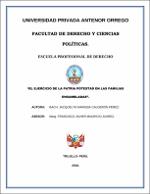| dc.contributor.advisor | Mauricio Juarez Francisco Javier | |
| dc.contributor.author | Calderon Perez, Jacquelyn Marissa | |
| dc.creator | Calderon Perez, Jacquelyn Marissa | |
| dc.date.accessioned | 2017-03-07T15:38:23Z | |
| dc.date.available | 2017-03-07T15:38:23Z | |
| dc.date.issued | 2017 | |
| dc.identifier | T_DERE_319 | |
| dc.identifier.uri | https://hdl.handle.net/20.500.12759/2406 | |
| dc.description.abstract | La investigación titulada “EL EJERCICIO DE LA PATRIA POTESTAD EN LA
FAMILIA ENSAMBLADA” se ha elaborado con el fin de determinar la necesidad
de regular la patria potestad a favor de los padres afines cuando uno de los
progenitores falleció, lo cual garantiza el interés superior del niño y fortalece a la
familia ensamblada. Para ello se analiza el origen y características de la familia
ensamblada, organización familiar común y representativa en nuestra realidad
social actual. Identificando las funciones y responsabilidades que de forma
espontánea, pública y frecuente asumen el padre o madre afín respecto de su
hijo/a afín conjuntamente con el padre o madre biológico.
Se reconoce la responsabilidad de Estado Peruano frente a esta problemática, al
no establecer normas jurídicas que amparen a este tipo de estructuras familiares
propiciando un clima de inseguridad y ambigüedad intrafamiliar, debido a que los
roles que desempeñan los padres afines no están expresamente establecidos en
la ley.
Es por ello que, con la presente investigación se determina la necesidad de
regular jurídicamente el ejercicio de la patria potestad en la familia ensamblada,
lo cual contribuirá a esclarecer cuales son las atribuciones y obligaciones de los
padres afines y con ello lograr mayor estabilidad, seguridad en este tipo de
estructuras familiares y por ende garantizar el interés superior de los niños y
adolescentes que en ellos se desarrollan. | es_PE |
| dc.description.abstract | The research entitled ““THE EXERCISE OF THE COUNTRY POTESTAD IN THE
ASSEMBLED FAMILY““ has been developed in order to determine the need to
regulate parental authority in favor of the related parents when one of the parents
died, which guarantees the superior interest of the parents. Child and strengthens
the assembled family. For this purpose we analyze the origin and characteristics of
the assembled family, common and representative family organization in our
current social reality. Identifying the functions and responsibilities spontaneously,
publicly and frequently assumed by the related parent with respect to his / her
related child in conjunction with the biological parent.
It recognizes the responsibility of the Peruvian State in the face of this problem, by
not establishing legal norms that support this type of family structures, fostering a
climate of insecurity and intrafamiliar ambiguity, since the roles played by the
related parents are not expressly established in the law.
For this reason, the present investigation determines the need to legally regulate
the exercise of parental authority in the assembled family, which will help to clarify
what are the attributions and obligations of the related parents and thereby achieve
greater stability, security In this type of family structures and therefore guarantee
the best interest of the children and adolescents that develop in them. | en_US |
| dc.description.uri | Tesis | |
| dc.format | application/pdf | es_PE |
| dc.language.iso | spa | es_PE |
| dc.publisher | Universidad Privada Antenor Orrego - UPAO | es_PE |
| dc.relation.ispartofseries | T_DERE_319 | |
| dc.rights | info:eu-repo/semantics/openAccess | es_PE |
| dc.source | Universidad Privada Antenor Orrego | es_PE |
| dc.source | Repositorio institucional - UPAO | es_PE |
| dc.subject | Patria Potestad | es_PE |
| dc.subject | Ensambladas | es_PE |
| dc.title | El ejercicio de la patria potestad en las familias ensambladas | es_PE |
| dc.type | info:eu-repo/semantics/bachelorThesis | es_PE |
| thesis.degree.level | Titulo Profesional | es_PE |
| thesis.degree.grantor | Universidad Privada Antenor Orrego. Facultad de Derecho y Ciencias Políticas | es_PE |
| thesis.degree.name | Abogado | es_PE |
| thesis.degree.discipline | Derecho | es_PE |

